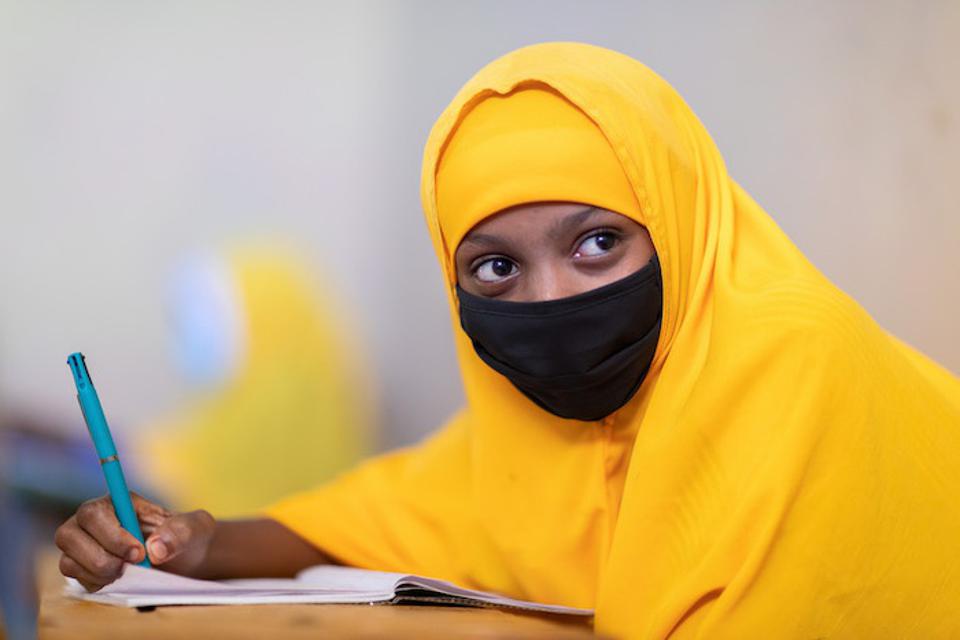Schools for 168 million kids have been completely closed for almost a full year, according to UNICEF — with potentially devastating consequences.

Panama is one of 14 countries where schools have remained largely closed for almost a year, according to new UNICEF data. Eight other countries in Latin America are on the list. © UNICEF/UN0359829/SCHVERDFINGER
Schools have been completely closed for almost a full year for more than 168 million children worldwide, according to the latest UNICEF data showing one of the most jarring impacts of COVID-19 lockdowns.
Another 214 million children globally – or 1 in 7 – have missed more than three-quarters of their in-person learning — with potentially devastating consequences for children’s well being and future development.
In sharing its latest analysis, UNICEF renewed a longstanding call for governments to prioritize the reopening of schools to end a “catastrophic education emergency.” The most vulnerable children and those unable to access remote learning are at an increased risk of never returning to the classroom, often forced into child marriage or child labor.
And for the majority of schoolchildren worldwide, school is the place to go to interact with peers, seek support, access basic health care — including vaccinations — and get a nutritious meal. The longer schools remain closed, the longer children are cut off from these critical services — and an essential element of childhood.
“With every day that goes by, children unable to access in-person schooling fall further and further behind, with the most marginalized paying the heaviest price,” UNICEF Executive Director Henrietta Fore said. “We must prioritize reopening schools, and we must prioritize reopening them better than they were before.”
As students return to their classrooms, they will need support to readjust and catch up on their learning. School reopening plans must incorporate efforts to recover children’s lost education. UNICEF urges governments to prioritize the unique needs of every student, with proper services in place to support remedial learning, mental health, protection and other needs.
Here’s a look at how some schools are bringing kids back to the classroom with UNICEF support.

Sisters Soraya, 10, left, and Assiatou, 6, heading to school in Nigeria © UNICEF/UN0393009/HARO
Like most families in Niger, the parents of sisters Soraya, 10, left, and Assiatou, 6, struggle to make ends meet, leaving little leftover for items like school backpacks. “We live life day by day,” says Fati, the girls’ mother. “For the poor like us, our dream is that one day our children can be independent and take care of each other. That’s why school is my only hope for them.” As schools reopen in the country, UNICEF and partners are supporting over 50,000 primary teachers with training in remedial instruction and by providing workbooks and other refresher course materials.

Primary school students in Lo Cai, Vietnam. © UNICEF/UNI329515/As more and more schools reopen, measures like handwashing stations, physical distancing and mask wearing are being integrated into school life. Above, primary school students in Lo Cai, Vietnam queue on arrival to have their temperatures checked.

A secondary school student in Juba, South Sudan. © UNICEF/UN0373712/CHOL
Daniel, 17, shows off his freshly-washed hands outside Nile International Academy in Juba, South Sudan, in accordance with a new school rule that requires washing with safe water and soap before entering the classroom. Daniel’s school reopened on Oct. 27, 2020, after a six-month COVID-19 shutdown. Some of Daniel’s classmates — some of them girls forced into early marriages — did not return.

A classroom in Mali. © UNICEF MALI/2021/CRENN
At Walirdé’s school in Sévaré, Mali, students received information about staying safe from COVID-19 from UNICEF through partner Apidev, a local NGO. Since the beginning of the pandemic, UNICEF has been working to raise awareness of the health risks while providing sanitation and hygiene supplies needed to strengthen infection prevention and control at schools and elsewhere in communities.

A primary school classroom in West Java, Indonesia. © UNICEF/UN0353433/WILANDER
Above, teachers at SDN Sukamaju primary school in Bandung, West Java province, Indonesia, mark classroom desks and chairs to ensure that students keep 6 ft. apart from each other to prevent the spread of coronavirus.

A student in class in East Kazakhstan.© UNICEF/UN0398162/KARIMOV
An 8-year-old student reads from her Russian language textbook at Kozhakeldy Batyr School in the remote village of Aksuat, East Kazakhstan. In response to COVID-19, the school limited classroom access to pupils in grades 1-4, with no more than 15 children in class at a time.

A student in Ethiopia.
© UNICEF/UN0392354/AYENE
Sumaya, 14, of Ethiopia is happy to be back at school after an 8-month shutdown. Her dream is to go to university and become a doctor. In 2020, UNICEF installed hundreds of handwashing stations and helped upgrade sanitation and hygiene at thousands of schools in the country to support their safe reopening. UNICEF also helped produce a teachers’ guide outlining safety measures and how to provide psychosocial support to students.
To learn more about how UNICEF and partners are guiding national and local authorites, see Framework for Reopening Schools.
Help UNICEF continue to support governments as they take steps to reopen schools and keep kids safe.
Maryanne Murray Buechner is a freelance writer and editorial consultant based in Hastings-on-Hudson, NY. A former daily newspaper reporter and contributor to TIME
…


